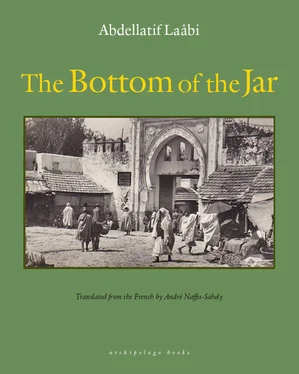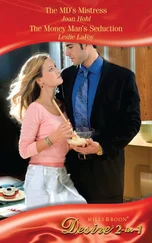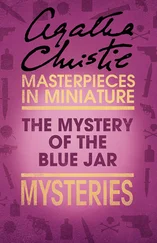
TIME WAS PASSING, and Namouss didn’t quite perceive it. He barely sensed the winds of change shyly blowing through his town, even though the signs were all there. What was happening to the Fezzis? Defying what people might say, some had recently started enrolling their daughters in school, even going so far as to allow the ones of marriageable age to go out in public without their head scarves and to dress in European-style clothes. Some married women also followed suit. They abandoned their head scarves, wore shoes with heels, and — scaling the heights of audacity — cut their hair short. Witnesses even reported seeing one of those Amazons behind the wheel of a car! An even more astounding rumor made the rounds regarding a young woman who had enrolled at a flight-training college and would soon qualify as a pilot.
This emancipatory momentum was accompanied by another phenomenon, which was considered more controversial for a different reason. Example: the sudden craze for imported household goods. Chinese ceramics began competing with traditional pottery. Bronze, silver, and copperware were progressively supplanted by plastics and tins. Namouss had witnessed this particular transformation when Driss decided one day to get rid of what he considered old junk: teapots, kettles, ewers, candlesticks, tea and sugar caddies, as well as antique trays. The whole lot was sold off to a shopkeeper in Nejjarine Square and replaced by newer items. While the proceeds of this transaction certainly added much-needed income to the meager family coffers, what was more astonishing was that Ghita raised no objections to this ransacking of her heirlooms.
Yet another change: While Radio Medina remained the preferred source of gossip and word-of-mouth news, many increasingly started turning to more reliable outlets. Once strictly reserved for the wealthy, radio sets began to grace most households, taking pride of place in the middle of the living room, and often decorated by beautiful embroidered cloths and crowned by a vase of artificial flowers. One steered clear of Radio Morocco, which was the colonial government’s mouthpiece, and instead tuned in to stations broadcast from Cairo or Moscow, as well as the BBC and Voice of America. People paid particularly close attention to the news but also took delight in listening to Oriental songs. Umm Kulthum, or the “Star of the East” as she was widely known, was already universally popular, but the radio facilitated the sensational rise of crooners such as Mohammed Abdel Wahab and Farid al-Atrash. It brought turmoil to formerly peaceful households, pitting brother against sister, sundering long-standing friendships — basically, it split society into two rival camps: those fanatics who pledged their loyalty to the Son of the Pharaohs and those equally fanatic fans of the Lebanese Druze. So it was no coincidence that moviegoing became astonishingly popular, and Namouss plunged headfirst into this craze.
THREE CINEMAS VIED for the patronage of the people of Fez. The most popular ones by far were the one situated in the somewhat rural neighborhood of El-Achabine and the one way out toward Bab Ftouh. The third, in Boujeloud, was frequented by a more sophisticated clientele and allowed women to while away their afternoons there. The competition between cinemas was stirred by which films were being shown. The El-Achabine specialized in detective films, Bab Ftouh showed Westerns, and Boujeloud practically had a monopoly on Egyptian films. Namouss ran with the hares and hunted with the hounds. He needed his weekly fix on Friday afternoons, which demanded much effort on his part. He was now too old to get in free with one of his older brothers. Making himself small didn’t fool the ticket inspector either. He had to pay. But securing the money was never a sure thing since Driss was the only one he could go to. The waiting game would commence at the beginning of the week and last right up until an hour before the start of the film on Friday afternoon. During this time, Namouss was on the lookout for any sign as to whether Driss was or wasn’t favorably inclined. Everything would depend on how business had gone for him that week at the souk: whether enough orders had come in, whether he had paid his rent arrears for the shop, and whether the cost of his materials had gone up or down. These considerations were augmented by others, most notably the pressures Ghita faced in setting aside enough money each day for the family budget, pressures that understandably affected her mood whenever Namouss got too insistent. But most difficult of all was Driss’s habit of taking a siesta right after the midday meal on Fridays. Was this a ruse to avoid dipping into his choukara ? Namouss was sure of it. He was left with no option but to make his request at the most unpropitious time, running the risk of receiving a flat refusal. As a result, he would pester Ghita to intercede on his behalf. She would begrudgingly consent but then pull out at the last minute. Namouss would be forced to approach the foot of the bed where his father was fast asleep. Driss would then sit up and, muttering some incomprehensible curses, would thrust his hand into his choukara and pull out a horribly crumpled ten-douro note, toss it on the ground, and immediately go back to sleep. Namouss would sheepishly pick it up and hightail it out of the house.
His destination on that day was Bab Ftouh, and he set off at break-neck speed. Namouss got there without a minute to spare. Dakhcha, a muscular man whose face had been ravaged by the pox, was just about to close the doors. Before letting the latecomer in, Dakhcha warned him he would have trouble finding a place. He was right, the movie theater was at full capacity. There was no hope of finding a seat. Namouss was forced to make do with the benches right at the front, which were almost on top of the screen. Even there, he had to haggle with the children already tightly squeezed into a tiny space for a sliver of bench barely large enough for one of his buttocks. For better or worse, he managed to wedge himself in. Then later he’d maneuver himself to create a bit more space. An opportune moment came when the cinema’s manager walked in and was welcomed by a roar of applause and cheers.
“Long live Bel Mokhtar!” the spectators shouted.
Some of the people next to Namouss carelessly stood up to better express their enthusiasm, allowing him to nonchalantly make his move. Mr. Bel Mokhtar got up on the stage. He called for silence and launched into a speech.
“Gentlemen, you’re only going to hear good news. You will love this week’s film. We had it sent from America. It features great actors. No idle chatter in this one, only action, and plenty of it. A hundred fists and two hundred gunshots — with both revolvers and rifles — and seven kisses. Have no fear, laâribi is going to face great dangers, but he will escape unscathed. At the end, he will marry l-bent who stood loyally by him through all his challenges. Next week’s film, which you will see a trailer of, will also be to your liking. Don’t worry. The same hero will return to take you on new adventures. He will marry a new heroine since the last one, poor thing — may God protect her soul — died in an accident. One last thing: Please remain calm should the reel snap or catch fire. We’ll fix it right away. I don’t want any mayhem, otherwise we’ll cut the film short. There you have it, I’ll leave you to it and see you next time.”
More cheering followed the end of the speech. Before long, the lights went out. Pathé’s robust rooster appeared on the screen and sounded its triumphant cock-a-doodle-doo.
“May God cut your throat!” one of the spectators cried at the top of his lungs.
Читать дальше













